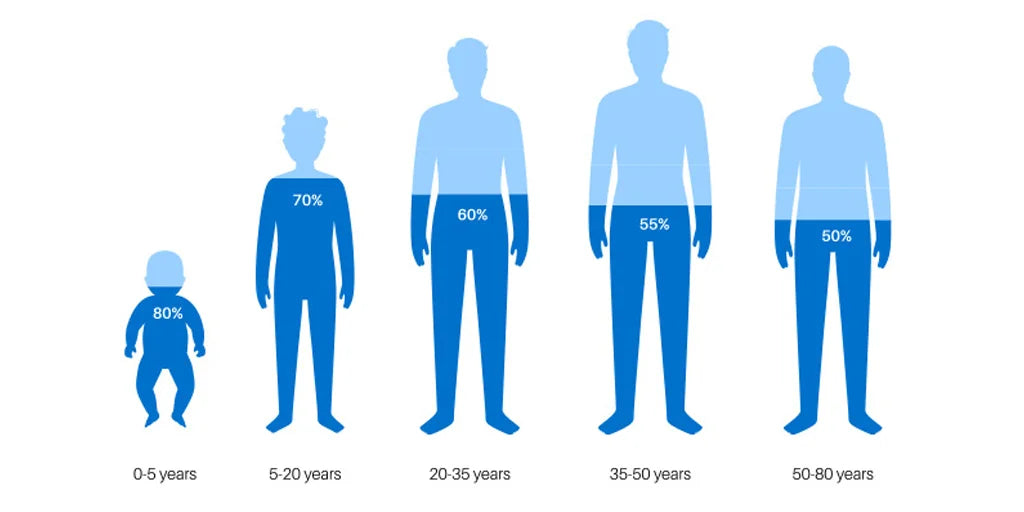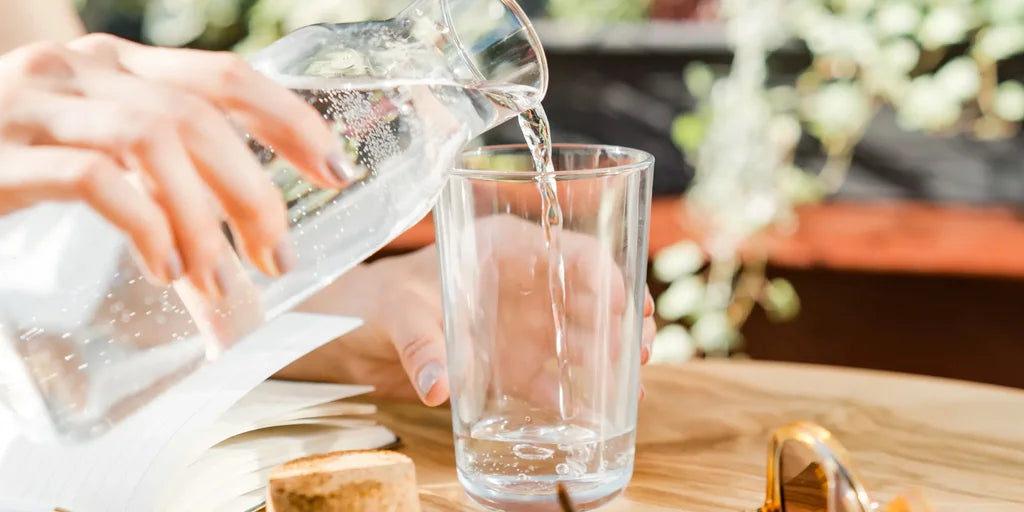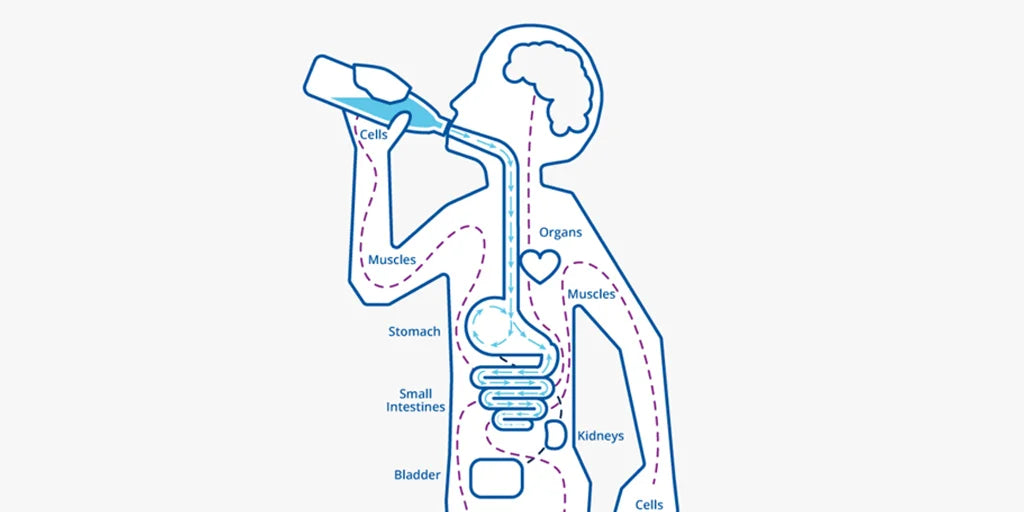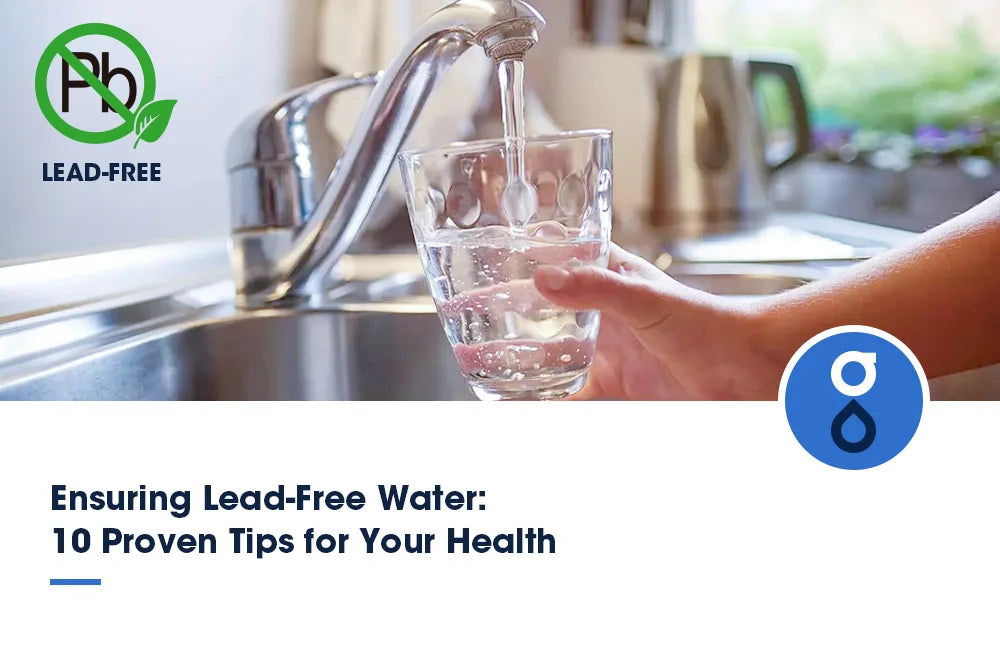Table of Contents:
How much water is in the human body?
Water`s journey through your body
How much water is enough for the human body per day?
Five tips to drink water for healthy bodies
FAQs
Conclusion
Have you ever wondered where the water you drink ends up? You grab your glass, take a sip, and then what? The journey of drinking water through your body is mysterious, with twists and turns that you might not even realize. Stay tuned to uncover the secrets of this vanishing act and discover where that life-sustaining liquid disappears to.
How much water is in the human body?

Water distribution in the body varies depending on age, gender, and body composition. On average, water makes up about 60% of total body weight. Due to differences in body composition, this percentage can be higher in infants and lower in elderly individuals.
Hydration levels play a crucial role in maintaining overall health. Water is distributed throughout the body in different compartments, such as intracellular fluid inside your cells and extracellular fluid outside your cells. These compartments help regulate various bodily functions like temperature control, nutrient transport, and waste removal.
Body composition also influences water distribution. Muscle tissue holds more water than fat tissue, so individuals with higher muscle mass tend to have more water in their bodies. Staying hydrated is essential for supporting bodily functions, regulating body temperature, and promoting overall well-being. Remember to drink adequate water daily to maintain optimal hydration levels and support your body's functions.
Water`s journey through your body
Digestive system: Water`s initial journey
As water enters your body, it embarks on its initial journey through the digestive system. Starting in the mouth, saliva begins the breakdown process as you begin to swallow. Once in the esophagus, the water moves towards the stomach, where it's greeted by stomach acid that aids in further digestion. From the stomach, the water then travels to the small intestine, where the absorption process will begin.
However, before reaching the small intestine, the water passes through the duodenum, the first part of the small intestine, where additional enzymes and bile are introduced to continue breaking down nutrients. This journey through your digestive system sets the stage for water absorption and essential nutrients.
Small intestine: Absorption process begins
Embarking on its journey through the small intestine, water and nutrients start absorption after passing through the duodenum, where crucial enzymes and bile further break down nutrients. Most water absorption occurs in the jejunum and ileum in the small intestine. The inner walls of the small intestine are lined with tiny, finger-like projections called villi, which increase the surface area available for absorption. Water molecules pass through these villi into the bloodstream through osmosis.
Nutrients like carbohydrates, proteins, fats, vitamins, and minerals are also absorbed alongside water. The small intestine plays a vital role in absorbing water and essential nutrients, ensuring your body gets the necessary elements for optimal functioning.
Bloodstream: Transporting water throughout the body
The bloodstream's crucial function is transporting water throughout the body. Once water is absorbed in the small intestine, it enters the bloodstream through tiny blood vessels called capillaries. These capillaries carry the water-rich blood to various parts of the body, delivering much-needed hydration to cells, tissues, and organs.
As blood circulates, it also carries essential nutrients and oxygen along with the water, ensuring that your body functions optimally. The bloodstream acts like a transportation network, efficiently distributing water and other vital substances throughout your body. With this intricate system, your cells will receive the hydration and nourishment they require to perform their functions properly. So, next time you drink water, remember how your bloodstream diligently carries it to where it's needed most.
Kidneys: Filtering and regulating water levels
After being distributed throughout your body by the bloodstream, water is further regulated and filtered by the kidneys to maintain optimal hydration levels. The kidneys are crucial in filtering waste and excess substances from the blood, including water. They adjust the water concentration in your body by either retaining it when you need to stay hydrated or excreting it when there's an excess. Through a complex process involving tiny filtering units called nephrons, the kidneys ensure that your body maintains the proper water balance.
Urinary tract: Elimination of excess water
To eliminate excess water from your body, the urinary tract plays a vital role in maintaining proper hydration levels. Once the kidneys filter out the waste and excess water from your blood, this fluid travels through the ureters to the bladder. The bladder is a storage reservoir until it fills up, triggering the urge to urinate. When you release urine, it flows out of your body through the urethra.
This essential process helps regulate your body's water balance and removes any extra fluids your system doesn't need. By efficiently eliminating excess water through the urinary tract, your body can stay hydrated and maintain its delicate internal equilibrium.
How much water is enough for the human body per day?

Adequate hydration is essential for optimal bodily functions and overall health. Hydration benefits include regulating body temperature, lubricating joints, and aiding digestion. The general water intake guidelines suggest consuming about 8-10 cups (64-80 ounces) of fluid daily, which can come from water, beverages, and moisture-rich foods. However, daily fluid requirements may vary based on age, gender, activity level, and climate.
Certain health conditions, such as kidney stones or urinary tract infections, can influence daily fluid needs, so increased water intake may be recommended. To determine if you're drinking enough water, monitor your urine color—pale yellow to clear indicates adequate hydration. Thirst is another indicator of needing more fluids, but it's best to sip water throughout the day rather than waiting to feel thirsty. Remember, staying hydrated is key to supporting your body's functions and maintaining good health.
Five tips to drink water for healthy bodies
Water with additives

To maintain a healthy body, choose water with natural additives like fruits or herbs for added flavor and benefits. When opting for water with these natural enhancers, you make hydration more enjoyable and boost your health with extra nutrients. Here are some tips to make the most of water with additives:
1. Experiment with different fruits: Try infusing your water with fruits like berries, citrus, or melons for a refreshing taste.
2. Explore Herbal Infusions: Herbs like mint, basil, or lavender can add a unique twist to your water while offering potential health benefits.
3. Avoid Artificial Additives: Avoid sugary syrups or artificial flavorings, which can negate the benefits of drinking water.
Sit down, drink your water
Sit back, take a moment, and savor each sip of water to nourish your body and promote overall health. Developing good hydration habits is crucial for your well-being. Here are some tips to improve your water intake and create healthy drinking rituals:
1. Carry a reusable water bottle with you wherever you go to ensure easy access to water throughout the day.
2. Set reminders on your phone or use apps to prompt you to drink water regularly.
3. Create a schedule for drinking water, such as a glass before each meal or setting specific hourly goals.
4. Infuse your water with fruits or herbs to add flavor and make hydration more enjoyable.
Right and proper timing

Timing your water intake throughout the day is crucial for optimal hydration and health. Hydration benefits are maximized by spreading your water intake rather than consuming large amounts simultaneously. Start your day by drinking a glass of water in the morning to kickstart your hydration. Keep sipping water throughout the day, especially before and after meals, to aid digestion and nutrient absorption. Dehydration risks can be minimized by staying ahead of your thirst - when you feel thirsty, you're already slightly dehydrated. Remember to drink water before, during, and after exercise to replenish fluids lost through sweat.
Sip on the water to flush down the meal
Savor each sip of water as it helps flush down your meal and promote a healthy body. Hydration benefits are numerous when you maintain adequate water consumption. Drinking water with your meals can assist digestion, ensuring that your body effectively breaks down food and absorbs nutrients. Adequate hydration can also help regulate body temperature and support various bodily functions.
By sipping water throughout the day, you can avoid dehydration, which can lead to health implications like fatigue, headaches, and decreased cognitive function. Make it a habit to sip on water consistently, not just when you're thirsty, to keep your body functioning optimally.
Salt it up
You can maintain a good hydration balance and support proper electrolyte regulation by paying attention to salt levels. Here are some tips to help you achieve that:
1. Monitor your salt intake: Be mindful of your salt consumption to prevent dehydration and maintain the right balance of electrolytes.
2. Drink electrolyte-enhanced water: Opt for electrolyte-infused water to replenish essential minerals lost through sweating and daily activities.
3. Add a pinch of salt: A pinch of salt in your water can improve taste and aid in electrolyte regulation.
4. Consume electrolytes-rich foods: Include bananas, oranges, and nuts in your diet to naturally boost electrolyte levels.
FAQs
Can the body absorb too much water at once?
Drinking excessive water at once can overwhelm your body's ability to absorb it efficiently. Consuming too much water rapidly can lead to water intoxication, disrupting your body's fluid balance.
What happens to water that is not absorbed by the body?
When you drink water, your body absorbs what it needs to stay hydrated and function properly. Any excess water that isn't absorbed is eliminated through urination, sweating, and breathing to maintain a healthy balance.
Conclusion
So, next time you take a sip of water, remember the incredible journey it takes through your body to keep you healthy and hydrated. Ensure you drink enough water daily to maintain proper bodily functions and overall well-being. Follow the five tips mentioned to ensure you're staying hydrated and healthy. Keep up the good habits, and keep that water flowing!

















